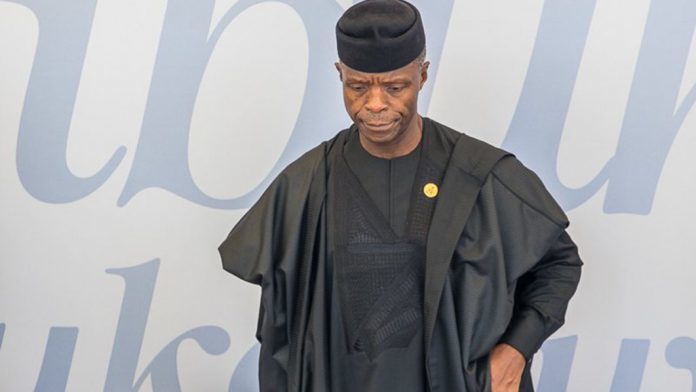By Jeph Ajobaju, Chief Copy Editor
Gas exploration and the Petroleum Industry Act (PIA) will combine to boost industrialisation and create an efficient oil industry with greater benefits for investors and other stakeholders.
Vice President Yemi Osinbajo pitched the idea in Abuja at a virtual event to commemorate the 25th anniversary of Sahara (Energy) Group.
President Muhammadu Buhari signed the PIA on August 16 and two days later approved a steering committee to oversee its implementation.
“Locally, we launch into the brave new world for the oil and gas industry with the Petroleum Industry Act 2021. And this happily converges with the launch of the Year 2020 to 2030 as the ‘Decade of Gas Development for Nigeria’.’
“This is a follow-up to the highly successful initiative of the Year 2020 as the Year of Gas,” Osibanjo said in a statement issued by his spokesman, Laolu Akande, reported by Vanguard.
“The main goal of the passage of the Petroleum Industry Bill and the gas initiatives aforementioned is to transform Nigeria not only into a gas-based industrialised nation through enhanced accelerated gas revolution, but also to help create a better-managed petroleum industry where both the people of Nigeria and investors alike can extract value.”
Osinbajo said the next 25 years will be defining for the energy industry.
He described Sahara Group as “a great ambassador for the Nigerian entrepreneurial brand” that has demonstrated “bold, innovative, knowledge-driven business models that are designed to seize opportunities in other countries and have done so with remarkable success in many African countries.”
Transition to zero emissions
Osinbajo reiterated the need for a just transition to zero emissions, as well as more advocacy to stop the defunding of gas and fossil fuel projects in developing countries.
“Already the wealthier nations and their institutions have banned all public investments in certain fossil projects, including natural gas.
“Examples include the European Union (EU), the United Kingdom, Germany and Denmark, as well as specific institutions such as the Swedfund from Sweden, Norway’s Sovereign Wealth Fund, the largest in the world, CDC, the development finance institution from the UK, the European Investment Bank, and the Investment Fund for Developing Countries from Denmark.
“The World Bank and other multilateral development banks are being urged by their shareholders to do the same. The AfDB [African Development Bank] is increasingly unable to support large natural gas projects in the face of shareholder pressure from their European members.
“Two weeks ago, the UN Secretary-General made a strong call, that ‘countries should end all new fossil fuel exploration and production, and shift fossil fuel subsidies into renewable energy.’”
Growth of Nigerian oil firms
Osinbajo said Nigeria is building coalitions with other countries for a just transition as the world advances to zero emissions.
“I will urge indigenous energy companies such as yourselves to join in the urgent advocacy that is required to prevent the disaster that would result from defunding oil and gas projects.”
He recalled that the last two decades have seen significant growth in Nigerian oil companies “from the days when Nigerian companies were mainly invested in the downstream sector to a situation now where we have Nigerian companies in the downstream, midstream and the upstream.
“Nigerian companies have shown capacity in operations and financing of oil and gas assets. Within this group of patriotic local investors, Sahara has consistently blazed the trail as industry leaders in not just the Petroleum sector, but in the Power sector as well.”
Osinbajo congratulated the Sahara Team for its 25 years of achievements in the energy industry and wished them more remarkable 25 years ahead.
He urged the group and other indigenous energy firms to take opportunities offered by the African Continental Free Trade Agreements.
Other speakers at the event included Democratic Republic of Congo President Felix Tshisekedi and AfDB President Akinwumi Adesina. Guests included Bureau of Public Enterprises Director General Alex Okoh and other top government officials.













